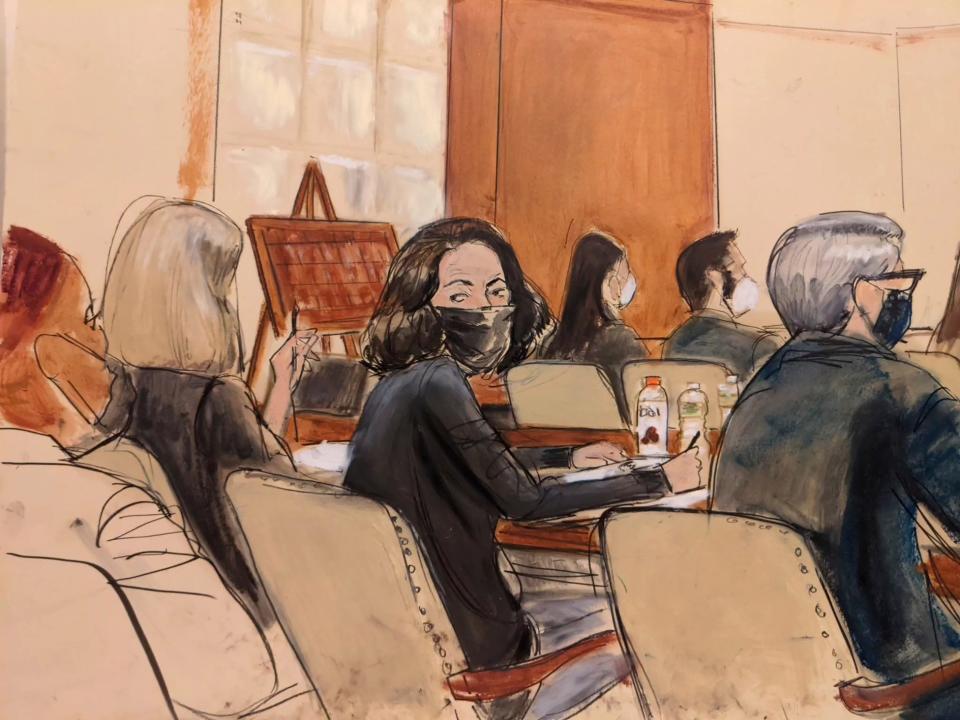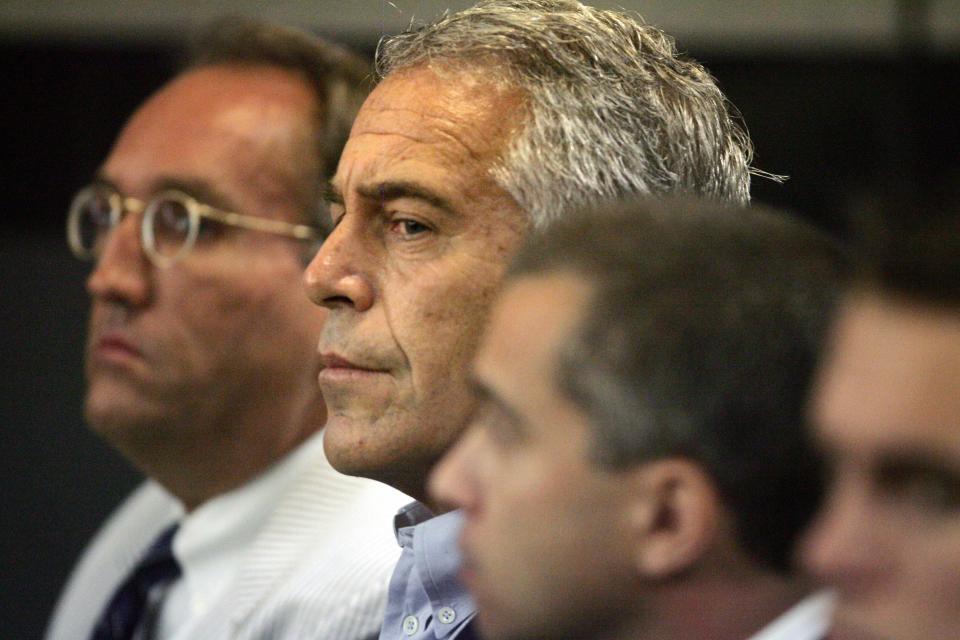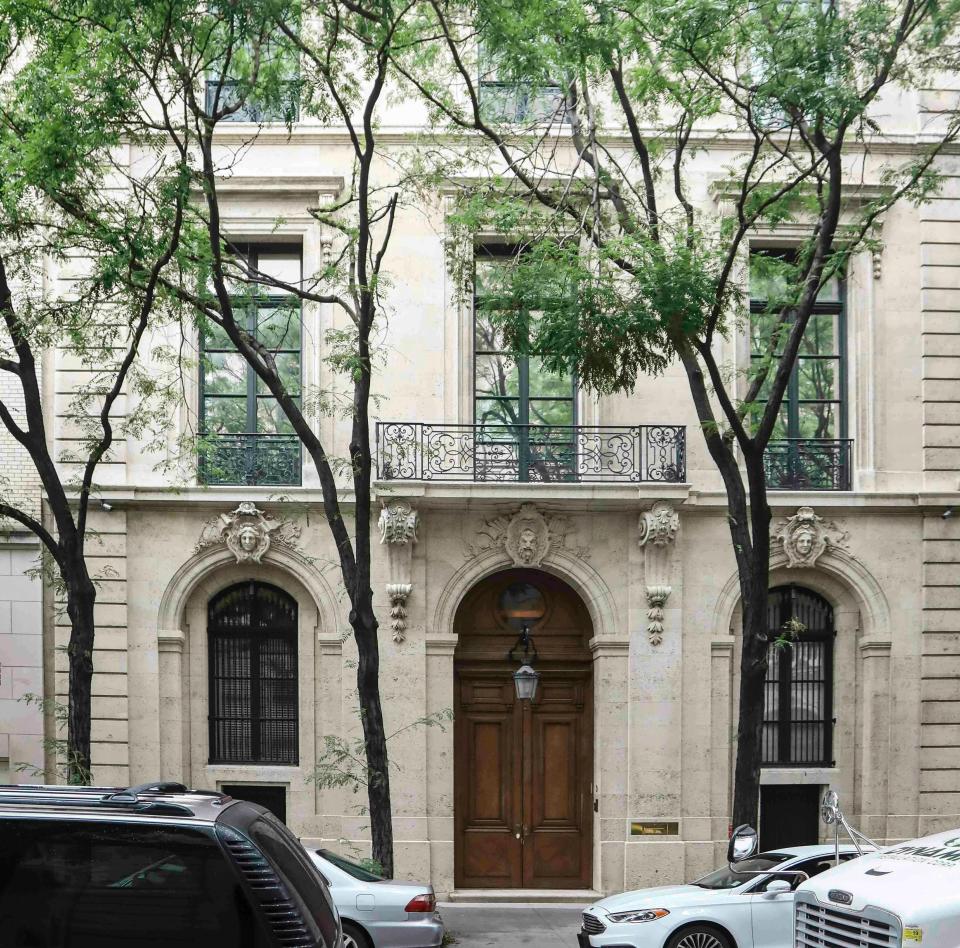Ghislaine Maxwell's accusers say she sexually exploited them. Here's what her trial may reveal
Opening arguments begin Monday in the federal sex trafficking trial of Ghislaine Maxwell, who is charged with helping her longtime companion, financier Jeffrey Epstein, recruit, groom and exploit girls as young as 14 years old for sexual abuse.
The alleged incidents ran from 1994 to 2004 in locations ranging from an Upper East Side residence in New York to an estate in Palm Beach, Florida, to a ranch in Santa Fe, New Mexico, to a residence in London.
The question for the jury will be whether the globe-trotting Maxwell, who turns 60 on Christmas Day, procured underage girls for Epstein, knowing he would abuse them.
“I think the case is probably going to rise or fall on the strength of the testimony of the alleged victims, as well as the witnesses who are not victims and whether the prosecution can convincingly tell a story about a longtime pattern of behavior,” said Paul Berman, a law professor at George Washington University. “And also whether people believe that Maxwell was so close to Epstein with regard to all of his day-to-day activities that it was implausible that she would not have known what was going on.”
Maxwell has denied all charges. Her expert witnesses are likely to challenge the reliability of accounts decades after the alleged incidents occurred. The witnesses include a forensic psychiatrist who testified against cannibal Jeffrey Dahmer and a criminology professor who testified at the trial of sex offender Harvey Weinstein.
The case against Maxwell, the daughter of a British media mogul, spawned widespread coverage, including in Vanity Fair and Town & Country magazines. Former President Bill Clinton and Prince Andrew of the United Kingdom traveled and partied with Epstein before his demise. Former President Donald Trump, who had been photographed with Maxwell, said at a news conference July 21, 2020, that "I wish her well."
Epstein, 66, a convicted sex offender from a state-level case in Florida, hanged himself Aug. 10, 2019. He was in detention awaiting trial on charges of sex trafficking.
The trial is essentially the one opportunity for the victims to have their day in court. Epstein avoided federal prosecution in 2008, when he pleaded guilty in Florida to similar accusations – from at least one of the same alleged victims – and the victims weren't notified about the agreement. Epstein was sentenced to 13 months in a Palm Beach county jail but was granted work-release privileges that allowed him to spend six days a week, 12 hours a day at his office.
Maxwell emerged from the earlier case largely unscathed. She attended Chelsea Clinton's wedding in 2010, founded the environmental group TerraMar Project in 2012 and was photographed at Vanity Fair's Oscar party in 2014. She faced civil lawsuits alleging complicity in Epstein's abuses and gave a deposition in 2016 denying wrongdoing.
“Maxwell enticed minor girls, got them to trust her and then delivered them into the trap that she and Jeffrey Epstein had set,” Acting U.S. Attorney Audrey Strauss said when Maxwell was arrested last year. “She pretended to be a woman they could trust. All the while, she was setting them up to be abused sexually by Epstein and, in some cases, Maxwell herself.”
Maxwell’s lawyers argued that she was charged as a proxy for Epstein. Her lawyers contend charges based on events decades ago are too stale to pursue or should be thrown out as part of the earlier non-prosecution agreement with Epstein in Florida.
“Ms. Maxwell vigorously denies the charges, intends to fight them, and is entitled to the presumption of innocence,” one of her lawyers, Mark Cohen, wrote in a court filing.
U.S. District Judge Alison Nathan estimated the trial could run through the holidays, including the days between Christmas and New Year’s.
Charges include enticing illegal sex, trafficking
Maxwell faces six charges: conspiracy to entice minors to travel to engage in illegal sex acts, enticement of a minor to travel to engage in illegal sex acts, conspiracy to transport minors with intent to engage in criminal sexual activity, transportation of a minor with intent to engage in criminal sexual activity, sex trafficking conspiracy and sex trafficking of a minor.
The indictment accuses Maxwell of attempting to befriend girls by asking them about their lives, their schools and their families. She took them shopping or to movies. Maxwell discussed sexual topics and undressed in front of them, according to the indictment. Eventually, she handed them to Epstein for sexualized massages and sex acts, after which Epstein, Maxwell or another staffer paid each girl hundreds of dollars, according to the indictment.
The alleged victims will be named by pseudonyms during the trial. Courtroom artists were ordered not to draw them.
More: Ghislaine Maxwell denies introducing Prince Andrew to teen sex partners, in deposition transcripts
"Victim 1" was about 14 when the interactions began in 1994 and ran to 1997, according to the indictment. After traveling to the Epstein properties in New York and Florida, the girl engaged in sexualized massages and sex acts with Epstein, according to the indictment.
"Victim 2" was under 18 when she was flown to Epstein’s New Mexico ranch in 1996. Epstein provided the girl with an unsolicited massage while she was topless, according to the indictment.
"Victim 3" was under 18 when Maxwell befriended her in London in 1994 and 1995, according to the indictment. Maxwell introduced her to Epstein for sex acts during massages, according to the indictment.
"Victim 4" was about 14 when she began visiting Epstein’s Palm Beach estate from 2001 to 2004, according to the indictment. Epstein engaged in multiple sex acts with the girl, the indictment said.
Prosecutors said victims provided "detailed, credible and corroborated information" against Maxwell. Other evidence includes flight records, diary entries and business records, they said.
“As the facts set forth in the Indictment make plain, the evidence in this case is strong,” Assistant U.S. Attorney Alison Moe said in one filing.

Maxwell contends charges fall under Epstein's non-prosecution deal
Maxwell’s lawyers contend the charges should be thrown out because they overlap, the transportation charges were the subject of a non-prosecution agreement and the trafficking charges are no longer applicable because of a statute of limitations.
During an investigation of similar accusations, Epstein reached a non-prosecution agreement with federal officials in Florida in exchange for pleading guilty to state-level prostitution charges and registering as a sex offender.
Maxwell’s lawyers contend she should have been protected from federal charges under the agreement, as a potential co-conspirator. Nathan ruled the agreement didn’t prevent the federal charges in New York.
Maxwell’s lawyers argued that Victim 4 first made her accusations in 2007 during the Florida investigation, but she never implicated Maxwell. The victim benefited from Epstein’s non-prosecution agreement when he paid for her lawyers in her civil suit against him but returned with the accusations against Maxwell, according to defense lawyers. Epstein paid $12.5 million in settlements to multiple victims.
The indictment “demonstrates just how far the government is willing to go to ‘get’ Ms. Maxwell and disingenuously blame her for the crimes of Jeffrey Epstein,” said a filing from one of her lawyers, Christian Everdell.

Maxwell denies abusing girls
The initial indictment against Maxwell alleged she lied under oath to conceal the crimes. In 2016, she gave a deposition in connection with a civil lawsuit in New York, where she was asked about the abuse of minors. She repeatedly denied the accusations.
“I don’t know what you’re talking about,” Maxwell replied when asked whether Epstein had a scheme for recruiting girls for massages.
“I wasn’t aware that he was having sexual activities with anyone when I was with him other than myself,” Maxwell said at another point.
“I have not given anyone a massage,” Maxwell said.
Her lawyers objected to several prosecution exhibits in the case, including a picture of a vibrator called “Twin Torpedoes.” Maxwell denied during the deposition being aware of sex toys or devices in the Palm Beach house.
“No, not that I recall,” she said.
Prosecutors dropped two charges of perjury from the indictment in order to hold a separate trial, which hasn’t been scheduled.

Disputes over trial prep, witnesses
Maxwell’s lawyers wrangled with authorities throughout the preparation for trial. Conflicts covered how lawyers traded papers with Maxwell during visits and the quality of videoconferencing when meetings were remote.
Disputes arose over how the trial would be conducted. Maxwell sought to prevent prosecutors from calling witnesses in the case “victims,” a term ruled inadmissible in the Wisconsin trial of Kyle Rittenhouse. Nathan, the judge for Maxwell, allowed the term for girls who were under 18 years old at the time of the allegations.
Among the eight expert witnesses Maxwell seeks to call, the prosecution objected to two who have been involved in high-profile cases for decades.
Park Dietz, a forensic psychiatrist, testified for the prosecution at trials for serial killer Jeffrey Dahmer and John Hinckley Jr., who attempted to assassinate President Ronald Reagan, and consulted on the case against Unabomber Ted Kaczynski.
Dietz is expected to testify about multiple pathways to false sex assault allegations. He is likely to argue that “grooming” has no consistent definition and imputes motive without adequate evidence. Dietz also could testify about “hindsight bias,” which describes a tendency to overestimate how predictable something is after an event.
Elizabeth Loftus, a professor of criminology at the University of California, Irvine, testified for the defense in the trials of murderer Ted Bundy and movie producer and sex offender Harvey Weinstein. Loftus is expected to testify about how memory fades and weakens and can be vulnerable to contamination.
U.S. Attorney Damian Williams asked the court to block parts of their testimony because "many of those opinions are also unreliable." He asked that Dietz be precluded from testifying about hindsight bias or false allegations of sexual abuse and Loftus from testifying about false memory formation.
Berman, the law professor, said eyewitness testimony is sometimes unreliable, but patterns of behavior could emerge from multiple witnesses.
“Eyewitness testimony isn’t always reliable, even less reliable when a lot of time has passed,” Berman said. But “once you start seeing a pattern of behavior, then obviously the credibility of any one of witness is substantially increased. It’s hard for the defense to argue that all of them are deceived or all of them are remembering incorrectly in hindsight.”

Maxwell's complaints about detention
Since her arrest July 2, 2020, Maxell has repeatedly complained of onerous conditions at Metropolitan Detention Center in Brooklyn. Her requests to be released pending trial were rejected four times.
Maxwell claimed that a guard physically abused her and that she was losing weight, hair and her ability to concentrate and prepare for trial. Her lawyers argued that she was treated worse than similar detainees because of Epstein’s death, under 24-hour surveillance, and that it hurt her ability to prepare for the trial.
Prosecutors argued Maxwell was a flight risk. She had passports from the United States, France and United Kingdom and numerous bank accounts worth tens of millions of dollars. She traveled frequently – at least 15 international flights in the three years before her arrest – to locations including the United Kingdom, Japan and Qatar, according to Customs and Border Protection records.
The government identified 15 bank accounts held by or associated with Maxwell with balances ranging from hundreds of thousands of dollars to $20 million. The $15 million sale of a New York City residence in 2016 through a limited liability company occurred about the same day $14 million was deposited into one of her accounts, according to court records.
After Epstein's indictment in July 2019, she lowered her high profile in New England for about a year before her arrest, according to prosecutors. She appeared to seek to avoid detection by changing locations at least twice, switching her primary phone number registered under the name “G Max” and ordering deliveries under a different name, prosecutors said.
Authorities found her through a mobile phone-tracking device after she called her lawyer and sister. She was tracked to a 156-acre property in Bradford, New Hampshire, acquired in an all-cash purchase in December 2019 “through an anonymized” limited liability company, prosecutors said.
“In short, Maxwell has three passports, large sums of money, extensive international connections, and absolutely no reason to stay in the United States and face the possibility of a lengthy prison sentence,” Moe said in a court filing.
Maxwell is the daughter of Robert Maxwell, a publishing tycoon and former member of the British Parliament who died in 1991 after falling overboard from his luxury yacht, Lady Ghislaine, named after the youngest of his nine children.
She was born in France and raised in the United Kingdom. She moved to the USA in 1991 after graduating from Oxford University and became a naturalized citizen in 2002.
“Ms. Maxwell has never once attempted to ‘hide’ from the government or her accusers, and has never shown any intent to leave the country,” Cohen wrote in a court filing. “To the contrary, Ms. Maxwell has always vehemently denied that she was involved in illegal or improper conduct related to Epstein, and her conduct has been entirely consistent with someone who fully intends to remain in this country and fight any allegations brought against her.”
This article originally appeared on USA TODAY: Ghislaine Maxwell trial to begin related to Jeffrey Epstein sex abuse

 money
money 